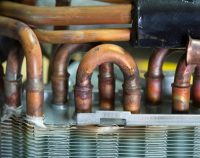Heat Transfer: 4 PDH
$24.00
The transfer of heat is an integral part of many industrial processes. Moreover, heat transfer affects our everyday lives – from an oven heating our dinner to the wind cooling us on a hot summer day. Thus, it is important that the engineer understands how to apply the basic principles of heat transfer to solve real-world problems.
SPECIFIC KNOWLEDGE OR SKILL OBTAINED
This course teaches the following specific knowledge and skills:
- Heat transfer definitions and terminology, including heat flux, thermal conductivity, LMTD, and heat transfer coefficients
- Conduction and the equivalent resistance formulas
- Convection and use of the overall heat transfer coefficient
- Radiant heat transfer, including black bodies, gray bodies and emissivity
CERTIFICATE OF COMPLETION
You will be able to immediately print a certificate of completion after passing a 15 question multiple-choice quiz. The quiz can be retaken unlimited times until a passing grade of 70% or better is earned. This course satisfies 4 professional development hours (PDH) of continuing education.
Related Courses
Systems Engineering Fundamentals Part 1: 5 PDH
$30.00 Add to cartPart one of a two-part course, this course provides a thorough overview of the systems engineering process and presents a in-depth review of the tools and processes to to develop a system efficiently and effectively and to support that system through its life cycle. Instructor: Seth Grablow, PESPECIFIC KNOWLEDGE OR SKILL OBTAINED
This course teaches the following specific knowledge and skills:
- Explain systems engineering management
- Understand the systems engineering process
- Discuss requirement and functional analysis and allocation
- Discuss systems engineering and the verification process
- Explain the outputs of the systems engineering process
- Understand work breakdown structure and configuration management
CERTIFICATE OF COMPLETION
You will be able to immediately print a certificate of completion after passing a twenty (20) question multiple-choice quiz. The quiz can be retaken unlimited times until a passing grade of 70% or better is earned. This course satisfies five (5) professional development hours (PDH) of continuing education.
Preview CourseClick “Preview Course” to View Prior to PurchaseClick “Add to Cart” to Purchase and Access QuizHeat Exchangers Fundamentals: 4 PDH
$24.00 Add to cartHeat Exchangers are a vital part to many industrial and consumer systems. They can be found anywhere from power plants and breweries to cars and HVAC systems. Heat Exchangers are vital for transferring heat from or between fluids. Knowledge of the fundamentals behind the use and design is vital to anyone involved with mechanical systems. This course reviews the practical applications of thermodynamics, heat transfer, and fluid flow principles covered in other PDH courses.Instructor: Seth Grablow, PEHeat Exchangers are a vital part to many industrial and consumer systems. They can be found anywhere from power plants and breweries to cars and HVAC systems. Heat Exchangers are vital for transferring heat from or between fluids. Knowledge of the fundamentals behind the use and design is vital to anyone involved with mechanical systems. This course reviews the practical applications of thermodynamics, heat transfer, and fluid flow principles covered in other PDH courses.
SPECIFIC KNOWLEDGE OR SKILL OBTAINED
This course teaches the following specific knowledge and skills:
- Methods of Constructing Heat Exchangers
- Types of Heat Exchangers
- Review Rate of Heat Transfer equations
- Applications of Heat Exchangers
CERTIFICATE OF COMPLETION
You will be able to immediately print a certificate of completion after passing a 15 question multiple-choice quiz. The quiz can be retaken unlimited times until a passing grade of 70% or better is earned. This course satisfies 4 professional development hours (PDH) of continuing education.
Preview CourseClick “Preview Course” to View Prior to PurchaseClick “Add to Cart” to Purchase and Access Quiz




